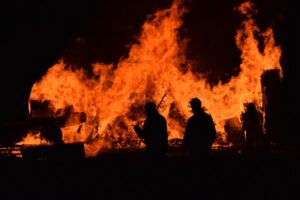The Infamous Fire Risks of Nevada & What To Do About Them
 The authorities in Nevada have devised strict laws to control the infamous fires as much as possible. However, natural fires cannot be entirely controlled and can easily lead to fires at commercial and personal properties. The high temperature, wind pressure, and climate change effects have combined over the years to put Nevada at high fire risk.
The authorities in Nevada have devised strict laws to control the infamous fires as much as possible. However, natural fires cannot be entirely controlled and can easily lead to fires at commercial and personal properties. The high temperature, wind pressure, and climate change effects have combined over the years to put Nevada at high fire risk.
This combination has placed pressure on property owners in Nevada to fireproof their properties. Here are seven measures that you can take as a property owner in Nevada to reduce fire risk and control fire damage at your property:
Install and Maintain Smoke Alarms
Installing smoke alarms greatly helps reduce fire risks. However, many people make the mistake of installing only one smoke alarm on a property. Smoke alarms should not be present on every floor but should also be present in every room where a fire can start.
If you have multiple kitchens or kitchenettes on your property, there should be a smoke alarm at each of these places. Living rooms with fireplaces also need a smoke alarm of their own. The smoke alarm will go off whenever the fireplace is used, but the alarm can be turned off in those cases. If you have an outdoor fire pit or grill, you need a smoke alarm at the backyard entrance too.
Installing smoke alarms isn’t enough. It is also crucial to maintain them. Check all installed smoke alarms every month to ensure they’re working and change their batteries whenever needed.
Keep Plants Alive and Trimmed
Dead leaves and branches on a property increase the fire risk. As dead leaves and branches are dry, they catch fire quickly and can spread it quickly too.
To reduce fire risk at your property, you need to ensure that all plants on the property are alive and healthy. Regularly trim all shrubs and branches. After trimming, sweep the outdoors and properly dispose of all the dead leaves, broken twigs, and branches.
Make sure you regularly water your outdoor house plants. In case a plant dies or withers, get rid of it as soon as you can.
A lot of people utilize dead tree branches and twigs for DIY décor projects. However, dead twigs and branches can cause fire damage inside the home too. Please dispose of all dead plants the correct way and avoid using them as décor.
Maintain Roof
Maintaining a roof can reduce fire risk and control fire damage in case a fire begins. You need to regularly clean your roof of any debris to maintain it. Look for any possible cracks or broken or misplaced shingles too. Repair even the tiniest crack and make sure it’s perfect at all times
To ensure reduced fire risk, install another layer of the roof under the main structure. The second layer should be made up of a hard, non-combustible material
Close Vents and Outlets
Vents and outlets make your home vulnerable to fire by allowing any possible combustible materials inside. Closing all vents and outlets and ensuring their controlled use can greatly reduce unwanted, unknown materials entering your home.
Build Non-Combustible Extensions
Like the roof, a non-combustible layer between the wall structures or an extension of the property can help reduce fire risk and control fire damage. Non-combustible extensions can keep your home safe from outside fires by acting as a boundary wall. Moreover, if a fire breaks out at your home, non-combustible extensions keep it under control and stop it from spreading.
Educate Family on Emergency Protocols
Installing preventative measures alone cannot guarantee safety for you and your family. Any individual’s careless actions can put the entire house and household at risk. To ensure the fireproofing works and stays maintained, you must inform your family about all the measures.
Involve everyone during regular maintenance work to know what to do and what not to do in the house.
Make sure the family also knows how to save themselves in a case of fire. A small fire drill at home can prepare everyone to not panic and focus on surviving in case of a fire. Teach them to perfect the stop, drop, and roll trick that they can use if their clothes get on fire. Also, tell them to always prioritize their safety over material things and over helping others.
Device an Escape Plan
To fully prepare your home for fire risk, ensure emergency escapes from every room. Install at least two exits, either from doors or windows, in every room. If a household member is old or otherwise helpless due to a medical condition, create special escape exits from their room to the outside that are also safe.
Keep important documents and precious items in a fireproof safe when not in use. Keep fire extinguishers at easy access and train every member of the household to use them.
Finally, don’t forget to insure your property and other precious belongings against fire damage. It will bring you much relief in the unfortunate event of a fire at your property. You can also take extra measures by bringing professionals on board. Many restoration services in Southern Nevada, such as the 911 Restoration of Southern Nevada, provide thorough home preparation and home restoration services for fire risk and fire damage.


